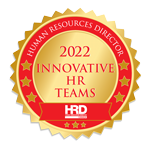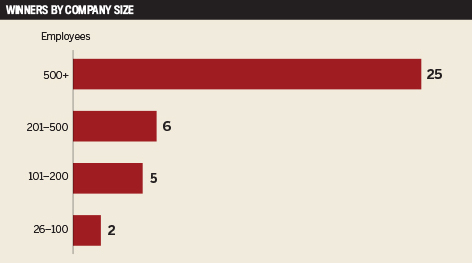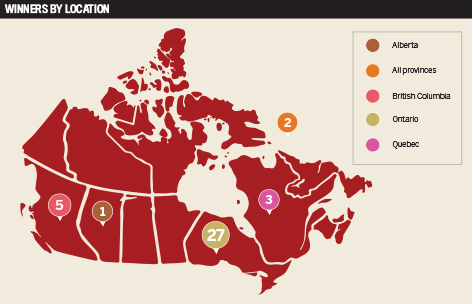

Jump to winners | Jump to methodology
It was the best of times, it was the worst of times. The age of COVID was as chaotic as it was transformational – running through organizations, cleansing and eroding archaic practices, paving the way for ultimate innovation. Government mandates dictated company-wide change, leading to overnight digitization and the advent of fully remote working models. In other words, it’s been pretty innovative. In that vein, HRD Canada launched its annual Innovative HR Teams report, which sought to find the best and brightest examples of innovation and analyze trends that facilitated change across the country.
“Attitudes toward bringing mental wellness into the forefront of health discussions has assisted in eliminating the stigma surrounding mental health, placed a higher priority on mental wellness, and restructured the way mental health services are provided”
Raeleen Manjak, City of Vernon

In conducting their research, the HRD Canada team found that a main area of innovative change centred around wellbeing and mental health. The past year has wreaked havoc on psychological wellbeing, with Canadians reporting feeling more stressed, depressed, isolated and anxious than ever before. A report from Champion Health found that 67% of employees experienced moderate to high levels of stress, with a further 28% admitting their productivity was affected by high stress levels through the pandemic. This mental health crisis forced employers to take a closer look at their current wellbeing initiatives, and for the most part they were found to be lacking. It was a shocking realization – but one that led to important change.
“Mental health and the discussion around mental wellness and employee support has transformed dramatically, most specifically over the past few years in managing the increase due to COVID-19 related stress, anxiety, and grief,” says Dr Raeleen Manjak, chief human resources officer at the City of Vernon, one of the Innovative HR Teams winners.
“Attitudes toward talking about and bringing mental wellness into the forefront of health discussions has assisted in eliminating the stigma surrounding mental health, placed a higher priority on mental wellness, and restructured the way mental health services are provided. Specifically, through innovation. No field has seen such a dramatic shift in care provision than the field of mental health. Through an augmented approach and availability of mental health and wellness services, the numerous types of services available continue to expand. In both online and in-person formats, many mental health and wellness service providers offer a comprehensive range of options,” she says.
“Innovation can play a large role in how employers navigate the Great Resignation, primarily by providing HR teams with new ways to align with employees, understand their priorities and quickly adapt to meet their needs”
Iman Masud, ADP Canada

As the country pivots away from the pandemic, employers have yet another crisis on their hands: the Great Resignation. Remote working models meant that employees can now apply to roles anywhere in the world, which is great for them but not so stellar for HR leaders. The global talent market is decidedly a candidate-led one, and the fight for top-tier applicants has never been more intense.
“Innovation can play a large role in how employers navigate the Great Resignation, primarily by providing HR teams with new ways to align with employees, understand their priorities and quickly adapt to meet their needs,” says Iman Masud, executive human resources relationship manager at ADP Canada, another winner. “The ability to do this is crucial when it comes to both retaining current employees and recruiting new ones.
“Innovation might look as straightforward as reinventing the work schedule or finding ways to give staff more personal time or additional flexibility. More complex solutions include introducing remote talent management platforms: highly effective with in-person, fully remote or hybrid work settings. These innovative tools keep lines of communication open and identify the strengths and tasks the employee values, keeping them engaged with their work and their workplace,” she says.
“With greater technology embedded in [work] processes, we also have access to more data than ever. Intentionally investing time to gather insights will only drive further innovation in HR”
Yvonne Tellis, North York General Hospital
Throughout HRD Canada’s research, one point was consistently reinforced: technology. There’s no denying that without tech, companies wouldn’t have survived the repercussions of COVID. While digital tools were always out there, the pandemic acted as a catalyst for their adoption, with the C-suite finally investing in much-needed HR software. Now, as organizations move into a hybrid way of working, employers are left wondering what role this new tech will play in 2022 and beyond – particularly around changing compliance rules.
ADP’s HR Survey Series with HR Outsourcing found that nearly 20% of US companies with 25 to 99 employees admit they were facing challenges with compliance and regulatory issues, which might increase as regulations change. To navigate forward, leaders will rely more heavily on real-time data to tackle compliance proactively and guide decision-making.
“Organizations have had no choice but to be more open to tech since remote work has become the norm across many industries,” added Yvonne Tellis, manager, HR systems at North York General Hospital, another recipient of the Innovative HR Teams accolade. “It started with online meetings, digital signatures, calendar apps, and virtual assistants. Every people process is now ripe for evolution. What we see in consumer trends inevitably spills over to HR tech and we see that happening more now. We’ve used chatbots to book appointments with our dentist or hairdresser for some time. Now, HR is embracing chatbots for all sorts of people interactions; to answer questions, screen candidates, follow up on tasks, and maintain connections with employees and candidates. With greater technology embedded in our processes, we also have access to more data than ever. Intentionally investing time to gather insights will only drive further innovation in HR.”
From chatbots to AI, from digital onboarding to the employee experience – it all revolved around the use of innovative technology. Organizations that were quick to adopt new tech, or perhaps already had them in place pre-pandemic, undoubtedly weathered the COVID storm better than their more ‘traditional’ rivals. A recent report from ADP found that greater innovation is expected to lead to organizational growth in 2022, with more and more businesses turning to tech to drive efficiency and close the skills gap.
In the near future, HR’s reliance on authentic innovation is expected to deepen. One area that HRD Canada’s research found to be growing in popularity was innovation’s role in employee upskilling and – by association – retention.
“There’s a need to facilitate further employee development,” says Masud. “According to ADP Research Institute’s ‘People at Work: A Global Workforce View’ report, 28% of staff have taken on new or changing roles as labour markets have shifted and business priorities have evolved. Now, many staff members want to continue their journey by adding new skills and certifications to help broaden their horizons. While this makes employees more valuable, businesses can only reap the benefits if they provide ongoing opportunities for skills development and career growth.”
The truth is that the pandemic changed the very idea of innovation in the HR field, and what was once a generic buzzword is now an integral part of organizational strategy. What the future holds for HR and the employee experience is still unclear. The only thing we can be certain of moving forward is that innovation will be a part of it.
HRD Canada’s Innovative HR Teams 2022 report recognizes firms that are breaking boundaries to move the HR industry forward in what has been a tumultuous year — whether it’s by taking a progressive approach to recruitment, introducing new technology or rolling out a ground-breaking reward and recognition strategy. The report offers HR teams a unique benchmarking opportunity to see how their initiatives compare to those of the profession at large.
Readers were invited to submit entries showcasing HR teams that have agile, bold and forward-thinking people strategies. Nominations focused on areas including talent management, diversity and inclusion, health and wellness, and HR technology. Initiatives introduced and results achieved in 2021 were highlighted. HRD Canada objectively assessed each entry for detailed information, true innovation and proven success — along with benchmarking against the other entries — to determine the winners.